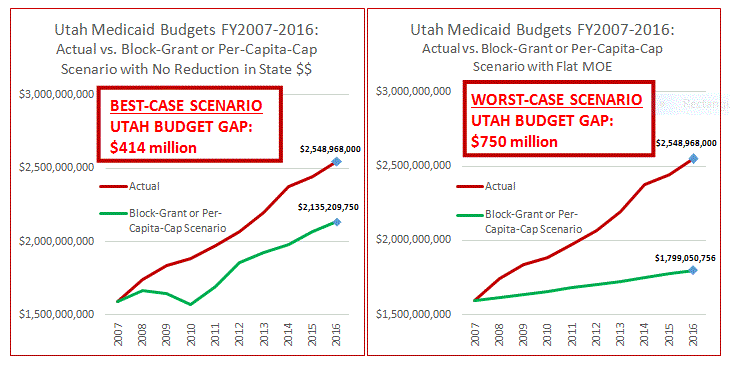Changes to Medicaid’s financing structure through a block grant or per capita cap would create large shortfalls in state funding. These would inevitably lead to limits placed on the program, such as a reduction in benefits or fewer children covered. The impact of these cuts would be even greater when utilization or enrollment goes up. For example, Utah would not be able to keep up with Medicaid demand during a recession, when many more children become newly eligible for and enroll in Medicaid. During the last recession, Medicaid added 30,000 enrollees in one year, a growth rate significantly higher than previous years. Under a block grant or per capita cap structure, the state would not be able to meet this sudden demand.
The charts below illustrate the Utah budget impact of the most recent House of Representatives block granting or per capita cap scenario if it had gone into effect a decade ago. The scenario is based on House Speaker Ryan’s federal budget proposal for FY2017. Under the proposal, Utah could expect to see a 25% cut to its federal Medicaid funding by the end of the first decade, because the proposal limited increases in federal Medicaid funding to the general consumer inflation rate rather than the medical cost inflation rate, which is higher (even for Medicaid, which has a lower inflation rate than private insurance). Thus, the scenarios below show federal Medicaid funding to Utah increasing annually by about 2% rather than the actual average increase of over 5%.
Since the Ryan proposal did not specify a state match or Maintenance of Effort (MOE) requirement, we present a worst-case scenario where Utah’s state Medicaid contribution remains flat at the FY2007 level and a best-case scenario where Utah’s state Medicaid contribution increases by 60% over the last decade (as it actually did in nominal terms, not adjusted for inflation).*
*Based on information available from Utah Medicaid Annual Reports. For additional information on Speaker Ryan’s proposals see the Congressional Budget Office report, “The Long-Term Budgetary Impact of Paths for Federal Revenues and Spending Specified by Chairman Ryan,” March 2012, .
For 30 years now, Voices for Utah Children has called on our state, federal and local leaders to put children’s needs first. But the work is not done. The children of 30 years ago now have children of their own. Too many of these children are growing up in poverty, without access to healthcare or quality educational opportunities.
How can you be involved?
Make a tax-deductible donation to Voices for Utah Children—or join our Network with a monthly donation of $20 or more. Network membership includes complimentary admission to Network events with food, socializing, and opportunity to meet child advocacy experts. And don't forget to join our listserv to stay informed!
We look forward to the future of Voices for Utah Children and we hope you will be a part of our next 30 years.
Special thanks to American Express, our "Making a Difference All Year Long" sponsor. 







